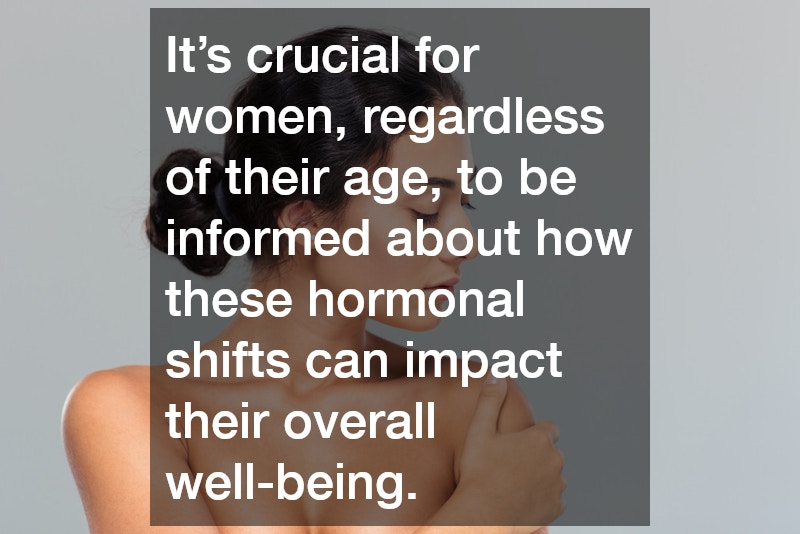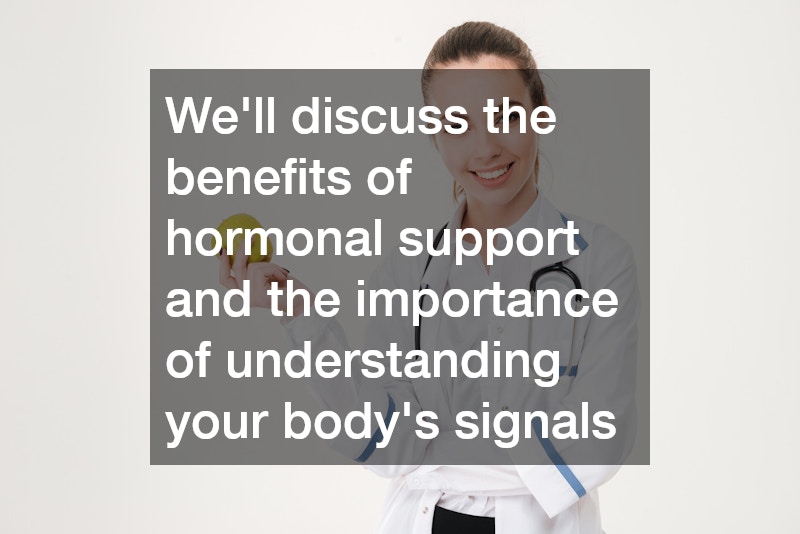
Und Erstanding womens health is a unique journey, particularly when it comes to navigating the complex interplay between hormonal changes, menopause, and fertility. As women transition through different life stages, their hormone levels fluctuate, leading to physical and emotional shifts. This can often leave many feeling bewildered, especially when dealing with symptoms such as hormonal irritability or unexpected changes in mood and physical health.

It’s crucial for women, regardless of their age, to be informed about how these hormonal shifts can impact their overall well-being. Whether you’re experiencing the first signs of menopause or are a young woman dealing with teen hormones, hormonal support can play a significant role in maintaining balance. Knowing when to seek help is vital; for instance, women are often unsure when they should get hormones checked. Regular check-ups can give you a clearer picture of your hormonal health.
This article explores the signs and symptoms of menopause and infertility and provides essential insights into hormonal changes throughout a woman’s life. We’ll discuss the benefits of hormonal support and the importance of understanding your body’s signals. Ultimately, being proactive about your health can improve your well-being and peace of mind during your journey through these changes.

 How caught up are you on your personal health? Whether you’ve visited your health clinic recently or make it a point to drink eight glasses of water a day, every little step counts toward creating a fuller and happier you. Women face unique health concerns and risks compared to men, particularly when hitting the middle-aged mark and facing the first stages of menopause and infertility, and need to be regularly caught up on important warning signs as they age. While a healthy lifestyle with regular exercise and a keen diet does wonders for your physical and emotional health overall, it’s still important to know the ins and outs of your unique brand of health.
How caught up are you on your personal health? Whether you’ve visited your health clinic recently or make it a point to drink eight glasses of water a day, every little step counts toward creating a fuller and happier you. Women face unique health concerns and risks compared to men, particularly when hitting the middle-aged mark and facing the first stages of menopause and infertility, and need to be regularly caught up on important warning signs as they age. While a healthy lifestyle with regular exercise and a keen diet does wonders for your physical and emotional health overall, it’s still important to know the ins and outs of your unique brand of health.Quick Facts
Let’s start off with some facts you may not know about. Smoking as little as five cigarettes per day has been associated with lower fertility rates in both men and women in the West. Menopause symptoms can include, but are not limited to, irregular periods, night sweats, sleep problems and slowed metabolism. Last, but not least, various factors such as economic stability and mental health can contribute significantly to menopause, infertility and more.
Menopause
Menopause is caused by changes in a woman’s hormonal levels, often brought on by age. According to a report published in the Journal of Epidemiology and Community Health, women who have lived through extensive periods of economic hardship were more likely to begin their physical transition at an earlier date. Once a woman has experienced at least one year without a period, she is officially classified as being in menopause — the remainder of her life will be considered post-menopausal. Life-long depression and similar forms of mental illness were also major factors contributing to early menopause.
Hormone Therapy
For women in their 50’s just entering menopause, hormone therapy is widely considered to be both a safe and effective treatment. It can be used up to five years and, contrary to popular belief, is not associated with an increased risk of heart disease. However, it’s still prudent to visit your regular doctor and receive a screening to make sure you’re not at risk for high blood pressure, breast cancer or other similar illnesses.
Infertility
Infertility is the medical term for individuals who are unable to conceive a child, caused by issues ranging from hormonal fluctuation to age to recent surgery. According to the Centers for Disease Control and Prevention, around 11% of couples have already experienced secondary infertility — this is defined as a couple with a child being unable to conceive again after a full year. Causes of infertility in women include changes in hormone levels and extreme stress. Whether you’re entering your first stages of menopause or are concerned about carrying a child, visiting your doctor is paramount to finding an accurate solution.
Menopause Solutions
If you’re experiencing your first stages of menopause or are curious about what you may be at risk for, it’s important to visit a womens health clinic and ask for a screening. They’ll diagnose any potential issues you may have, be it high blood pressure or mental illness, and determine the best course of action for you. Women under the age of 35 should try to get pregnant for at least one year before contacting their health professional about potential infertility. Infertility can be treated with medicine, surgery or intra-uterine insemination depending on your unique needs. Visit your regular doctor or a womens clinic as soon as possible to see what infertility solutions and menopause treatments are available to you.